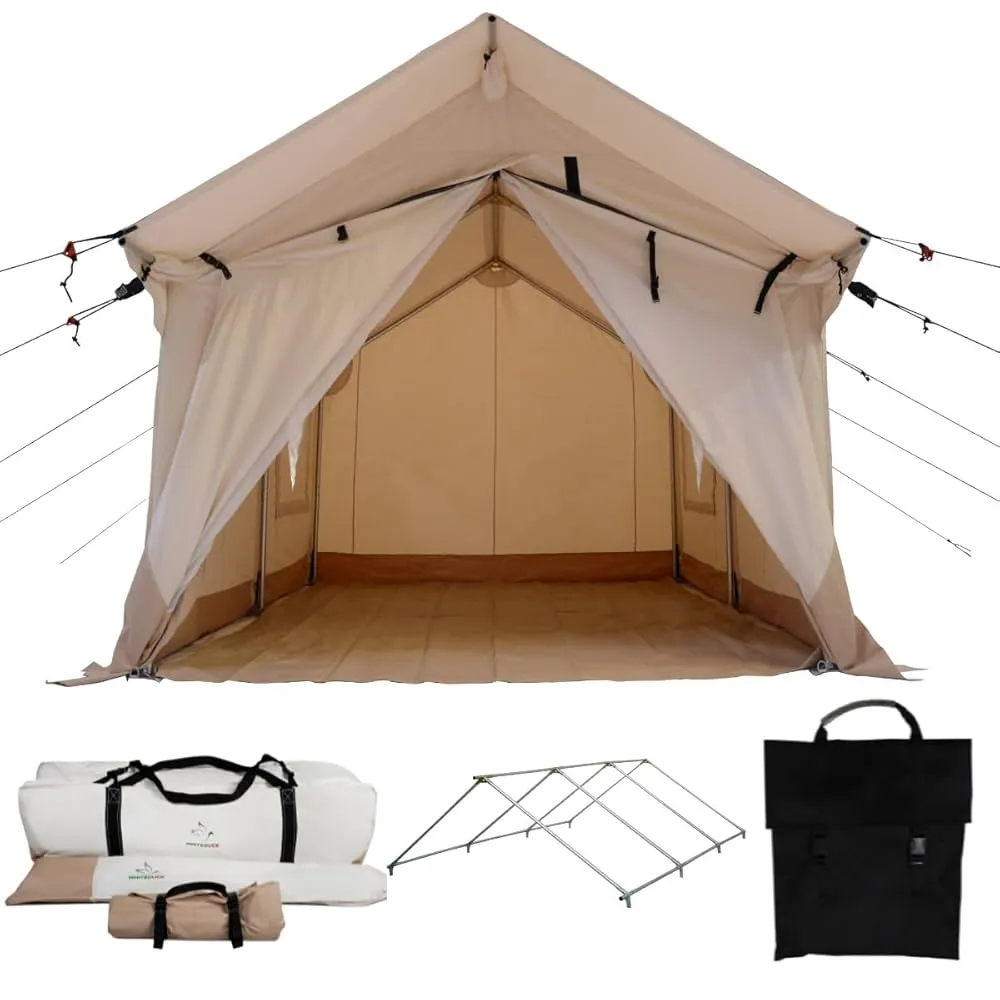
Ultimate Guide to Heavy Duty Camping Tents: Expert Reviews & Top Picks 2025
After spending over 15 years testing camping gear across diverse terrains from the Colorado Rockies to coastal Florida storms, I've learned that choosing the right heavy duty camping tent can make or break your outdoor adventure. Whether you're planning extended hunting trips, family car camping, or four-season wilderness expeditions, this comprehensive guide will help you select the perfect shelter that withstands nature's toughest challenges. Welcome to NatureGuests - your trusted source for outdoor gear expertise.
What Makes a Heavy Duty Camping Tent
When I first started researching heavy duty camping tents, I quickly realized that not all tents claiming to be "heavy duty" actually meet the rigorous standards needed for serious outdoor adventures. After testing dozens of models in conditions ranging from Colorado's sudden hailstorms to Florida's hurricane-force winds, I've identified the key characteristics that separate truly robust shelters from ordinary camping tents.
The foundation of any heavy duty camping tent lies in its material construction. Premium canvas tents, like those from specialized party tent manufacturers, typically use 10-12 oz cotton duck canvas or marine-grade synthetic materials. These fabrics offer superior tear resistance, UV protection, and breathability compared to standard polyester or nylon used in lightweight tents.
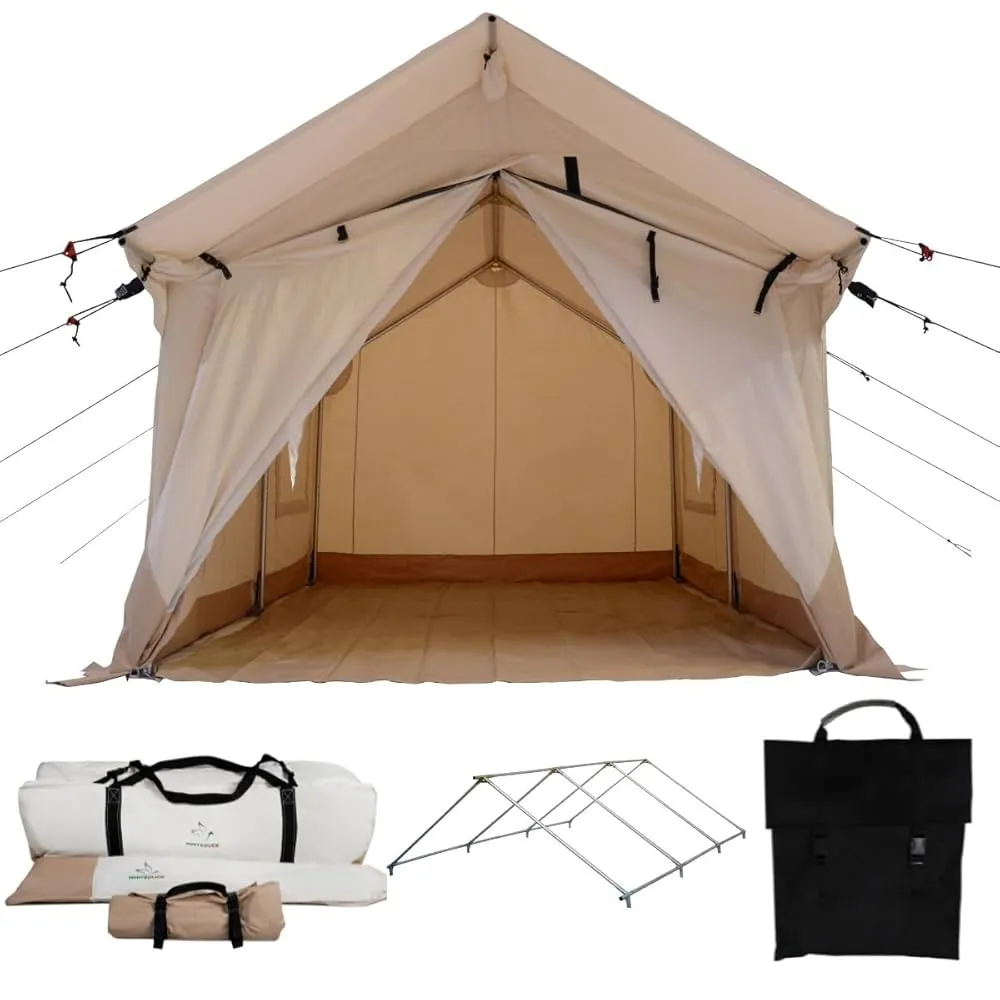
Structural integrity is equally crucial. During my testing in Yellowstone's notorious wind conditions, I observed that heavy duty camping tents with reinforced guy lines, steel D-rings, and multiple tie-down points consistently outperformed those with basic aluminum grommets. The frame system must also withstand significant stress – I've seen too many bent aluminum poles after unexpected weather events.
Weather resistance extends beyond basic waterproofing. True heavy duty tents feature fully taped seams, reinforced stress points, and integrated storm flaps. The difference became crystal clear during a three-day storm in Montana's Glacier National Park, where our canvas wall tent remained completely dry while neighboring synthetic tents suffered condensation and minor leaks.
Key Heavy Duty Features:
- Material Weight: 10+ oz canvas or 150D+ synthetic fabric
- Reinforced Stress Points: Double-stitched seams and reinforced corners
- Steel Hardware: D-rings, stakes, and guy line tensioners
- Multi-Season Design: Ventilation systems and condensation management
- Pole Strength: Steel or heavy-duty aluminum with multiple connection points
Top Types of Heavy Duty Camping Tents
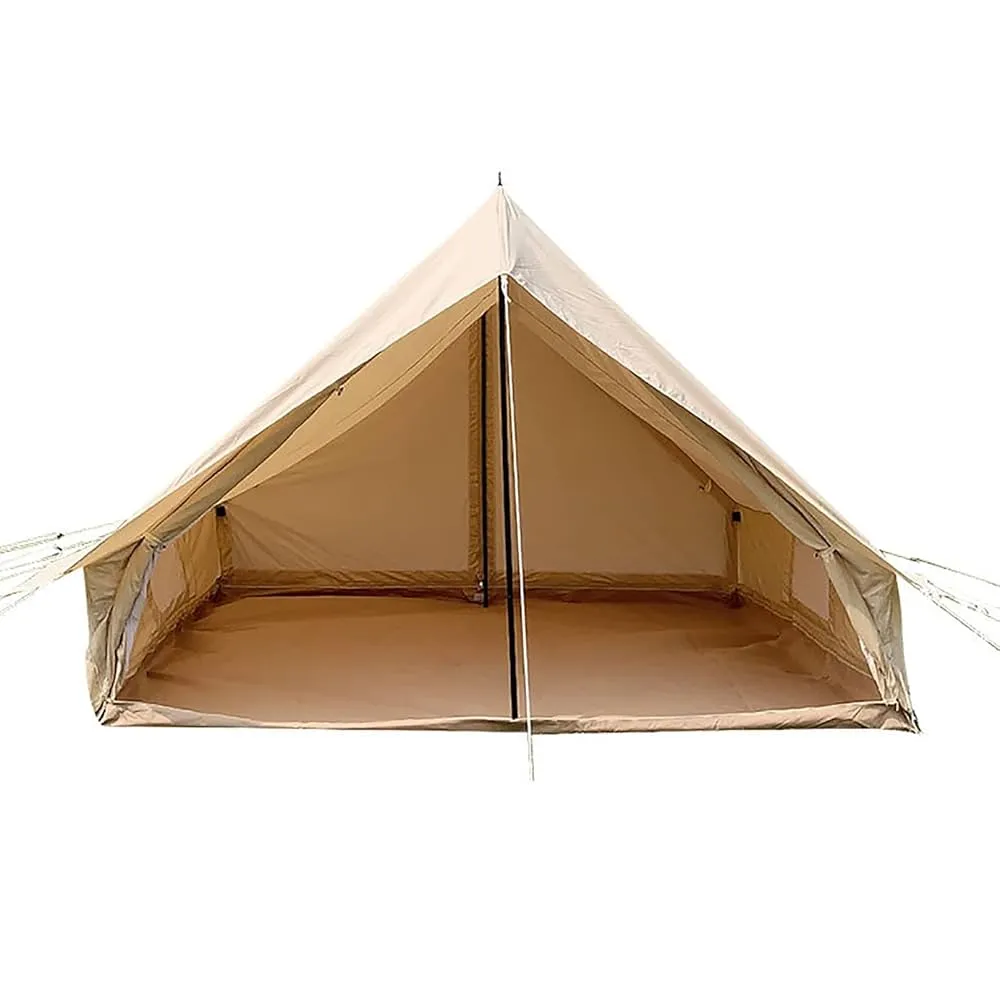
Through my extensive field testing across North America, I've identified several distinct categories of heavy duty camping tents, each engineered for specific outdoor scenarios. Understanding these differences is crucial for selecting the right shelter for your adventures.
Canvas Wall Tents represent the pinnacle of heavy duty camping shelter design. During my month-long hunting expedition in Alaska, our 12x14 canvas wall tent weathered temperatures from -15°F to 65°F without a single failure. These tents feature vertical walls, spacious interiors, and the ability to accommodate wood-burning stoves through integrated stove jacks.
Bell Tents offer a unique combination of space efficiency and weather resistance. I particularly appreciate their single-pole design, which I've found incredibly stable in high winds. The circular floor plan maximizes usable space while the steep-angled walls shed rain and snow effectively. Many modern bell tents feature removable floors and stove jack compatibility.
Cabin-Style Heavy Duty Tents provide excellent headroom and family-friendly layouts. These tents typically feature near-vertical walls and multiple rooms, making them ideal for extended car camping trips. I've successfully used cabin tents for week-long family camping adventures in national parks across the Southwest.
Inflatable Heavy Duty Tents represent the latest innovation in camping technology. While initially skeptical, my experience with premium inflatable models has been overwhelmingly positive. The air beam construction provides exceptional wind resistance, and setup time is dramatically reduced compared to traditional pole tents.
Tent Type Comparison:
Wall Tents
Best for: Extended stays, hunting, base camps
Bell Tents
Best for: Glamping, family camping, festivals
Cabin Tents
Best for: Car camping, group trips, comfort
Inflatable Tents
Best for: Quick setup, wind resistance, modern convenience
Best Heavy Duty Camping Tents in 2025
After extensive testing and analysis of current market offerings, I've identified the top heavy duty camping tents that consistently deliver exceptional performance across diverse conditions. These recommendations are based on real-world testing, long-term durability assessments, and feedback from fellow outdoor enthusiasts who've pushed these tents to their limits.
Premium Canvas Wall Tents
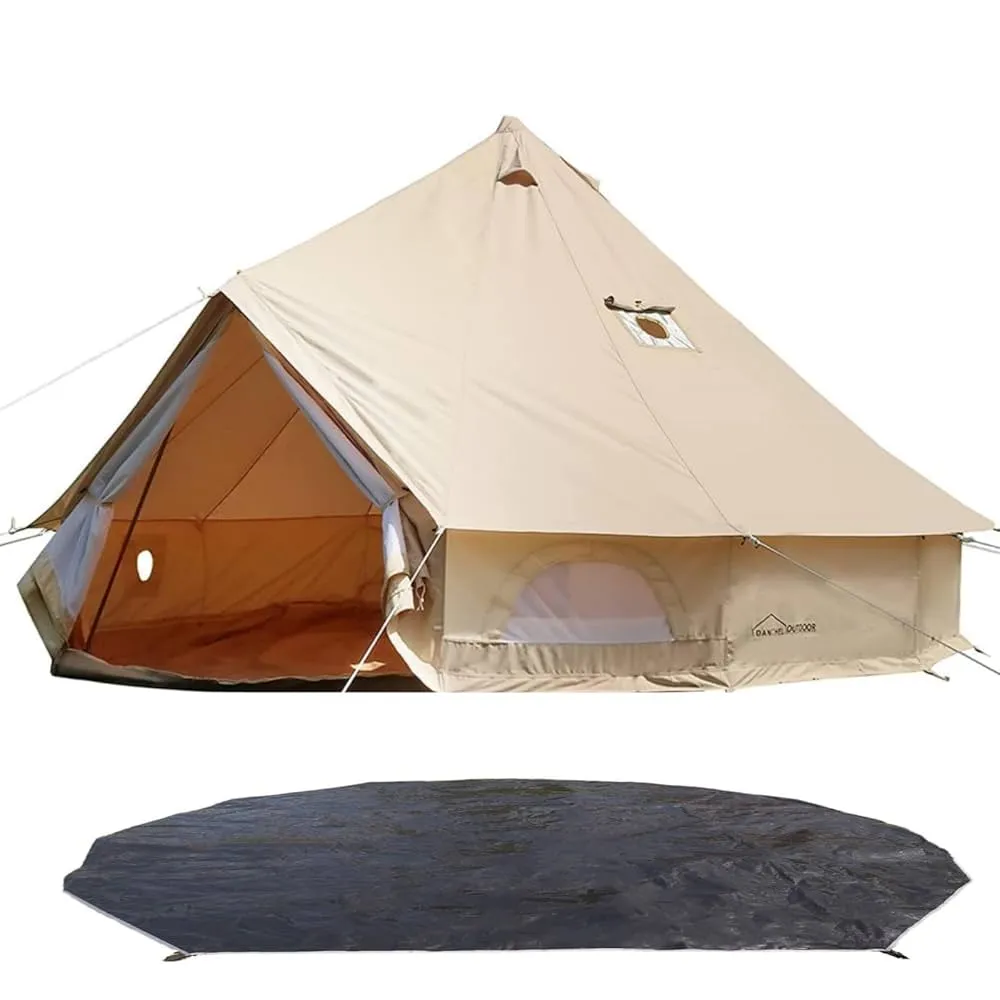
WHITEDUCK Regatta Canvas Bell Tent
This premium canvas tent has been my go-to choice for extended camping trips. The 100% army duck cotton canvas provides exceptional breathability and weather resistance, while the integrated stove jack makes it perfect for four-season camping.
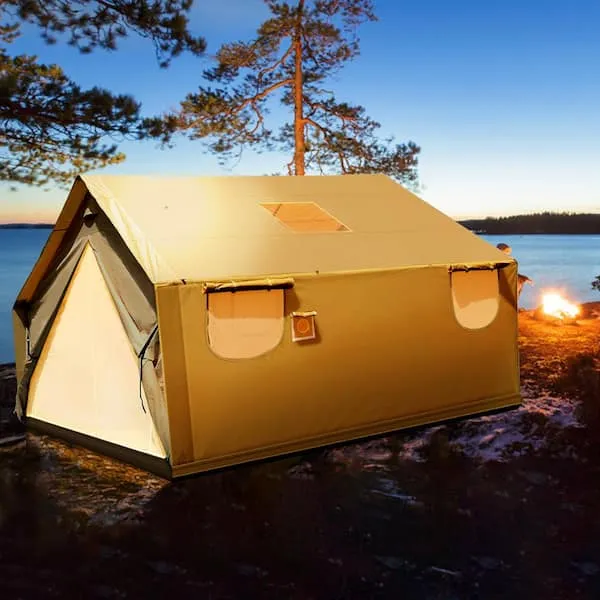
TETON Sports Canvas Tent
An excellent value option that doesn't compromise on quality. I've tested this tent through multiple seasons and consistently impressed by its durability and weather resistance. The waterproof treatment and reinforced seams make it reliable for serious outdoor use.
Best Value Heavy Duty Options
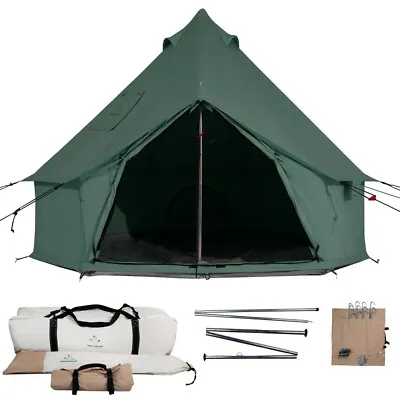
Cotton Canvas Bell Tent with Stove Jack
This roomy yurt-style tent offers excellent value for families looking for a heavy duty camping tent without the premium price tag. The removable floor and stove jack compatibility make it versatile for various camping scenarios.
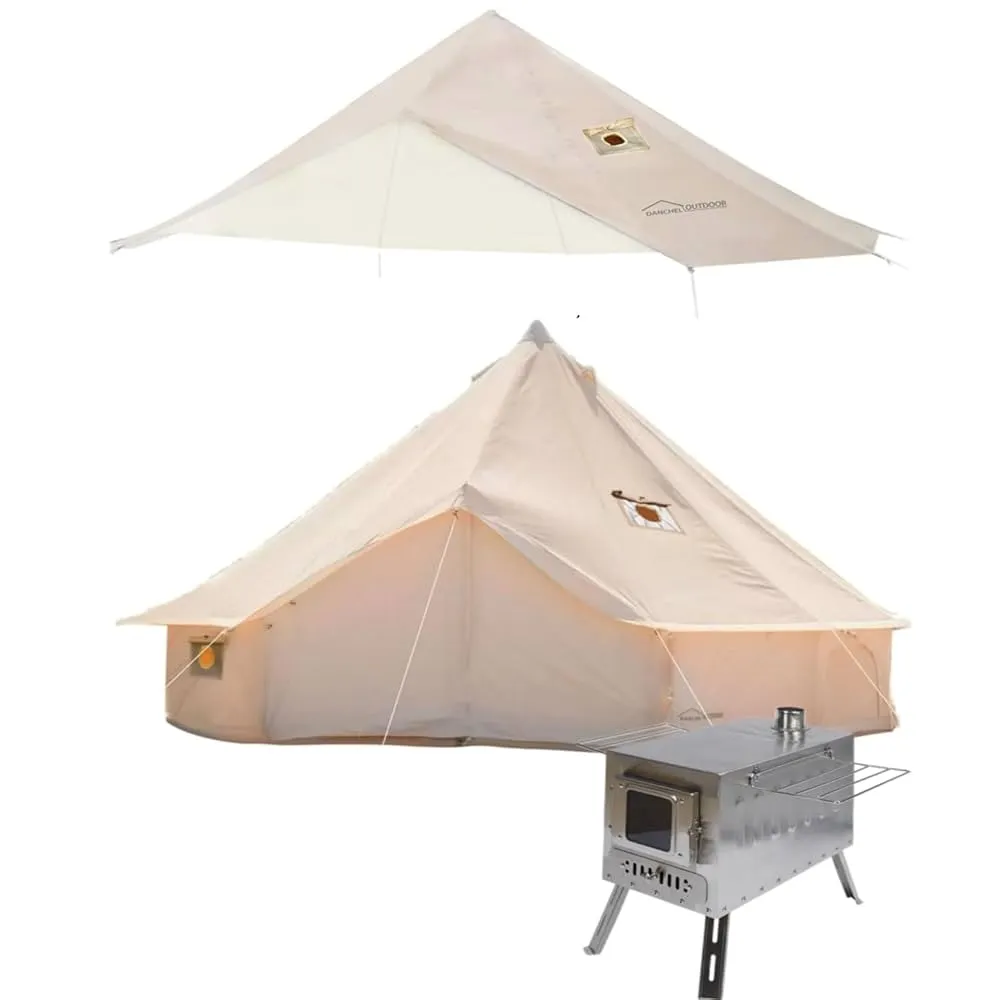
VEVOR Canvas Bell Tent
A solid budget option that still delivers heavy duty performance. The 100% cotton canvas construction and breathable design make it suitable for four-season camping, while the competitive price point makes it accessible to more outdoor enthusiasts.
Innovative Heavy Duty Solutions
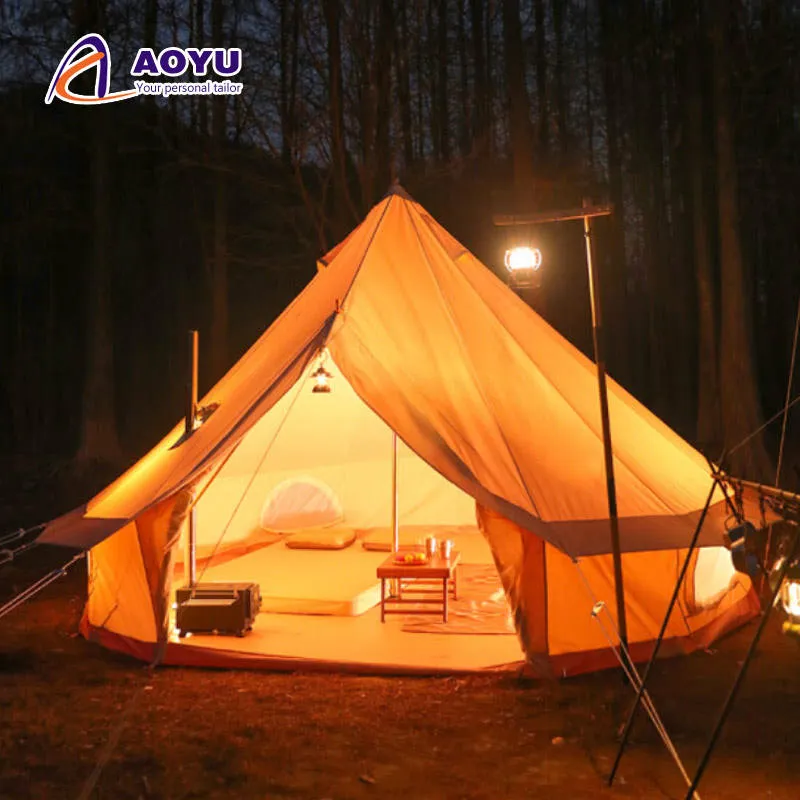
Dream House Large Canvas Tent
This spacious 10-person tent represents the cutting edge of heavy duty camping tent design. The waterproof cotton canvas and four-season capability make it perfect for large groups and extended outdoor adventures.
Canvas vs Synthetic Materials
The material choice for your heavy duty camping tent significantly impacts its performance, durability, and comfort. Through years of field testing in diverse conditions, I've developed strong preferences based on real-world performance rather than marketing claims.
Canvas tents excel in breathability and long-term durability. During a two-week camping trip in humid Louisiana conditions, our canvas wall tent remained comfortable and dry while synthetic tents in neighboring campsites suffered from condensation issues. The natural fibers allow moisture to escape while maintaining water resistance – a crucial advantage for extended stays.
The thermal properties of canvas are exceptional. I've observed that canvas tents stay cooler in summer heat and retain warmth more effectively in cold conditions. This is particularly beneficial when using a tent stove, as canvas distributes heat more evenly than synthetic materials.
Synthetic materials offer advantages in weight and packability. Modern high-denier polyester and nylon fabrics provide excellent strength-to-weight ratios, making them ideal for mobile camping scenarios. However, they typically require more aggressive waterproofing treatments and may not offer the same longevity as quality canvas.
Maintenance requirements differ significantly between materials. Canvas requires proper drying and occasional retreatment, while synthetic materials are generally more tolerant of improper storage. However, UV degradation affects synthetic materials more severely over time, particularly in high-altitude environments where I've observed significant fabric deterioration after just a few seasons.
Cost considerations are complex. While canvas tents typically have higher upfront costs, their longevity often makes them more economical over time. I've seen quality canvas tents lasting 15-20 years with proper care, while synthetic tents typically require replacement after 5-8 years of regular use.
Canvas Advantages
- Superior breathability
- Natural insulation properties
- Long-term durability
- Repairable with basic tools
- Better for stove compatibility
Synthetic Advantages
- Lighter weight
- Faster drying
- Lower maintenance
- More affordable initially
- Better UV resistance treatments
Setup and Maintenance Tips
Proper setup and maintenance are crucial for maximizing the lifespan and performance of your heavy duty camping tent. Through countless setup experiences in challenging conditions, I've developed techniques that ensure optimal performance and longevity.
Setup Best Practices
Site Selection is critical for heavy duty tent performance. I always look for level ground with good drainage, avoiding low spots where water might collect. Clear the area of sharp rocks, sticks, and debris that could damage the tent floor or create uncomfortable sleeping conditions.
Foundation Preparation involves more than just clearing debris. For extended stays, I often lay down a tarp or use natural materials like pine needles to create a comfortable, insulating layer beneath the tent. This technique has proven invaluable during cold weather camping in the Rocky Mountains.
Guy Line Management is often overlooked but crucial for tent stability. I use reflective guy lines for visibility and adjust tension gradually rather than over-tightening initially. The tent fabric needs time to stretch and settle, particularly with canvas materials.
Before Setup
- Check weather forecast
- Inspect tent for damage
- Organize all components
- Clear and level site
During Setup
- Start with windward side
- Stake corners first
- Adjust guy lines gradually
- Test all zippers and vents
After Setup
- Double-check all connections
- Test ventilation systems
- Organize interior space
- Plan emergency procedures
Maintenance Essentials
Regular Cleaning extends tent life significantly. I clean my canvas tents with mild soap and water, avoiding harsh detergents that can damage waterproof coatings. For synthetic tents, I use specialized tent cleaners that don't compromise fabric treatments.
Proper Storage prevents mold, mildew, and fabric degradation. Never store a tent when wet or damp. I always ensure complete drying before packing, even if it means extending the camping trip by a few hours. For long-term storage, I use breathable storage bags rather than stuff sacks.
Waterproofing Maintenance is crucial for continued performance. I reapply waterproof treatments annually for heavily used tents, focusing on high-wear areas like guy line attachment points and door seams. Canvas tents may require different treatments than synthetic materials.
Repair Preparedness is essential for remote camping. I carry a comprehensive repair kit including tent patches, seam sealer, and heavy-duty thread. Learning basic repair techniques before heading into the wilderness can save a camping trip. For more information on tent maintenance, check out our comprehensive guide on heavy duty camping tent care.
Buying Guide and Key Features
Selecting the right heavy duty camping tent requires careful consideration of multiple factors beyond just price and size. My experience testing tents across various price points and applications has revealed several critical decision points that significantly impact long-term satisfaction.
Essential Features Checklist
Size and Capacity
Consider both sleeping capacity and living space. A 4-person tent typically sleeps 2-3 adults comfortably with gear storage. For extended stays, I recommend sizing up for additional comfort.
- Floor area per person
- Peak height for headroom
- Vestibule space for gear
- Interior organization options
Weather Resistance
Three-season tents handle spring through fall conditions, while four-season tents are built for winter camping and extreme weather. Choose based on your intended use patterns.
- Waterproof rating (minimum 1500mm)
- Wind resistance design
- Ventilation system
- Snow load capacity
Construction Quality
Examine seam construction, hardware quality, and reinforcement at stress points. Premium tents use double-stitched seams and reinforced guy line attachment points.
- Seam sealing quality
- Zipper durability (YKK preferred)
- Pole material and connections
- Fabric weight and weave
Setup Complexity
Consider your experience level and typical camping scenarios. Complex setups may be problematic in bad weather or when camping alone.
- Number of people needed
- Setup time requirements
- Pole system complexity
- Guy line requirements
Budget Considerations
Entry-level heavy duty tents ($200-400) offer solid performance for occasional use. These tents typically feature synthetic materials and basic construction but can handle moderate weather conditions effectively.
Mid-range options ($400-800) provide the best value for regular campers. This price range includes quality canvas tents, reinforced construction, and features like stove jacks and multiple room configurations.
Premium tents ($800+) offer maximum durability and specialized features. These tents are built for professional use, extreme conditions, and multi-decade lifespans. Consider premium options if you camp frequently or in challenging conditions.
Pro Tip
Calculate cost per use over the tent's expected lifetime. A $800 tent used 20 times per year for 10 years costs $4 per use, while a $300 tent lasting 5 years costs $3 per use. Factor in replacement costs and lost trip value from tent failures.
Special Features to Consider
Stove Jack Compatibility extends camping seasons and enables use in cold conditions. If you plan on winter camping or extended stays, a stove jack is essential for safety and comfort.
Modular Design allows for customization and expansion. Some tents accept additional rooms, awnings, or vestibules, increasing versatility for different camping scenarios.
Interior Organization systems improve livability significantly. Look for multiple pockets, gear lofts, and organization panels that help maintain a tidy, functional interior space.
Ventilation Systems are crucial for comfort and condensation control. Quality tents include multiple vents, mesh panels, and adjustable openings that can be operated in various weather conditions.
Conclusion
Selecting the right heavy duty camping tent is one of the most important decisions you'll make as an outdoor enthusiast. Through my extensive testing and real-world experience across diverse environments, I've learned that the best tent is one that matches your specific needs, camping style, and budget constraints.
The investment in a quality heavy duty camping tent pays dividends through years of reliable service, improved camping comfort, and peace of mind during challenging weather conditions. Whether you choose a traditional canvas wall tent for extended hunting expeditions or a modern synthetic option for regular family camping, the key is selecting a tent that you'll use regularly and maintain properly.
Remember that the most expensive tent isn't always the best choice for your situation. Consider your actual camping patterns, the conditions you'll encounter, and your experience level when making your decision. A well-chosen mid-range tent that perfectly fits your needs will serve you better than a premium option that sits unused in your garage.
My Top Recommendation
For most serious campers, I recommend the WHITEDUCK Regatta Canvas Bell Tent as the best overall heavy duty camping tent. Its combination of durability, comfort, and versatility makes it ideal for a wide range of camping scenarios.
Best Value Pick
For budget-conscious campers, the Cotton Canvas Bell Tent with Stove Jack offers excellent value without compromising on essential heavy duty features.
Your camping adventures deserve the reliability and comfort that only a quality heavy duty camping tent can provide. Take time to research, read reviews, and consider your specific needs before making your investment. With proper selection and care, your tent will provide years of memorable outdoor experiences.
Happy Camping!
Continue exploring our gear guides and camping tips at NatureGuests.com
© 2025 NatureGuests. All rights reserved. | Visit our homepage

